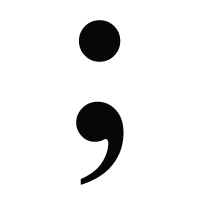Category Archives: grammar
The Great Semi-Colon Debate
Open Tuesday Rant: I Beg You to Stop
All right, I want you all to stop it.
I’m not the Language Sheriff. Grammar was not my strongest subject in school. I doubt I can tell a gerund from a gerbil. But there are some obvious sins that are creeping into our mother tongue. And some of them are worth beating back with a stick.
This is one of them.
“Begs the question” does not mean “Invites the question.”
It doesn’t. No matter how many times you use it that way, no matter how many talking-heads-trying-to-sound-smart blabber it on TV. Whoever started this trend should be taken out back and slapped around with a copy of Strunk and White.
Begs the question is a fallacy of logic. “Begging” here does not mean “pleading.” It is an alternative use of the word, and it means to “assume the answer.” It’s a form of circular reasoning.
Professor: Make an argument that war is always wrong.
Student: War is always wrong because too many lives are lost.
Professor: That begs the question. You assume that loss of life is, ipso facto, wrong. But you have yet to prove that. Loss of life might very well be justified for a greater purpose. Try again.
Student: Will this be on the test?
That’s what begging the question means. So when I hear some White House correspondent tell the home studio, “The President has decided to visit the Gulf Coast again, which begs the question, Will that do anything to stop the leak?” I want to make him eat his microphone so he can’t do any more damage with it.
So that’s my rant. Do not, under any circumstances, use begs the question as invites the question.
Now it’s your turn. What language sins drive you batty?

